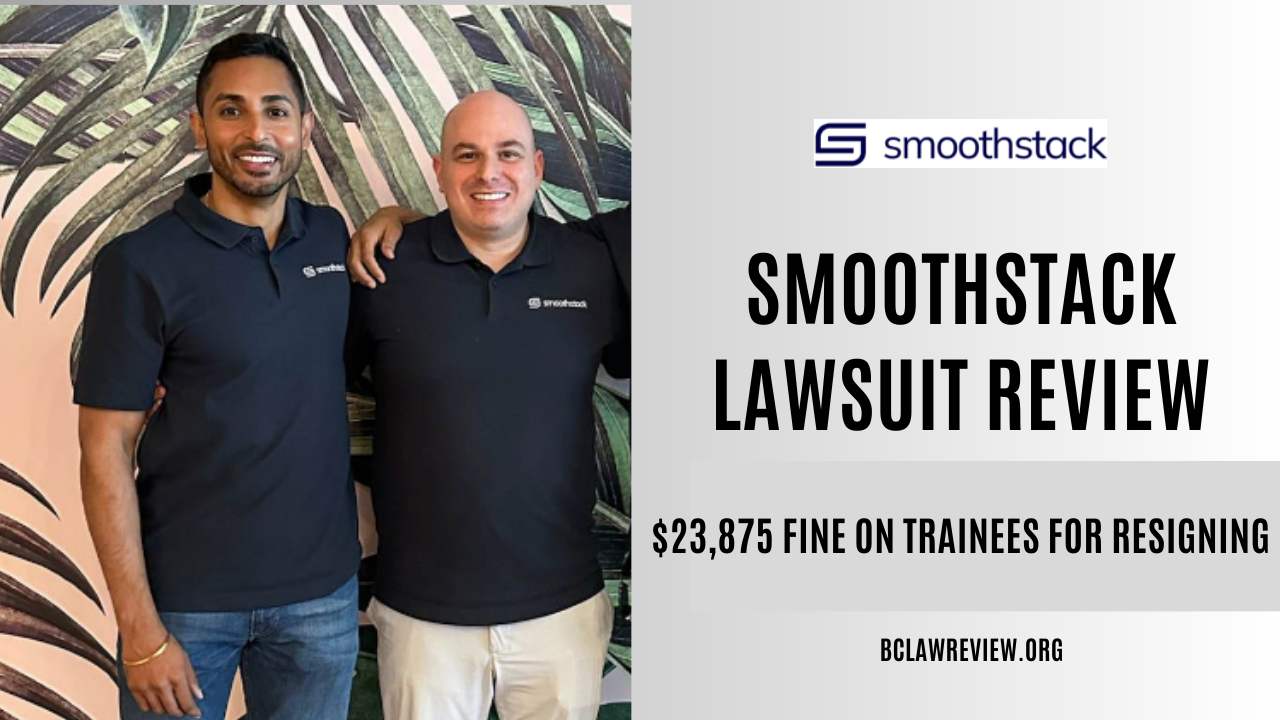Smoothstack is a prominent name in the tech staffing industry but has recently been found at the center of a major controversy. The company, known for its innovative approach to staffing and training, is now facing a lawsuit that has sparked widespread debate. The Smoothstack lawsuit highlights critical issues such as employee rights, corporate governance, and regulatory compliance.
Understanding the details and implications of this case is essential for stakeholders, including employees, industry peers, and legal experts.
Contents
- 1 Background of Smoothstack
- 2 What is Smoothstack Lawsuit – Controversial Training Contracts
- 3 Legal Arguments Against Smoothstack
- 4 Smoothstack’s Defense and Future Case Outlook
- 5 What Are Industry Reactions Upon this Lawsuit?
- 6 Regulatory Scrutiny and Public Perception
- 7 Long-term Implications for Smoothstack
- 8 Expert Opinions
- 9 Conclusion
- 10 People Also Ask
Background of Smoothstack
Smoothstack was founded with the mission to bridge the gap between tech talent and industry demand. Smoothstack quickly rose to prominence by providing intensive training programs and placing trainees in top companies.
Their business model revolves around sourcing, training, and deploying tech professionals to meet the growing needs of the industry. Over the years, the company has achieved several key milestones.
Their innovative training programs and strategic partnerships have made them expand their market reach significantly.
| Year | Milestone |
|---|---|
| 2016 | Smoothstack founded |
| 2018 | Launch of intensive training programs |
| 2020 | Reached 1000+ trainees |
| 2022 | Expanded to international markets |
| 2023 | Faced major lawsuit |
What is Smoothstack Lawsuit – Controversial Training Contracts

The controversy began when several former trainees filed a lawsuit against Smoothstack, alleging unfair practices in their training contracts. The plaintiffs claim that the terms of these contracts were exploitative and left them in financially precarious situations.
This lawsuit has drawn significant attention and multiple parties are now involved in the legal battle. Smoothstack requires you to accept a Training Repayment Agreement Provision (TRAP). There is a TRAP that states that if you leave early, Smoothstack will demand over $20,000 from you.
- Condition: Submit 4000 billable hours to Smoothstack clients.
- Fine: Getting fired or quitting before the 4000-hour mark will cost you $23,875 in fines.
Legal Arguments Against Smoothstack
The plaintiffs argue that these contract terms are unfair and potentially illegal. They claim that the contracts effectively bind trainees into long-term commitments under threat of significant financial penalties.
The legal basis of the lawsuit centers on the argument that such terms constitute an unfair restraint on trade and violate labor laws.
Among the allegations against Smoothstack are:
- The average trainee works 80+ hours per week.
- They are not paid for the first three weeks by Smoothstack.
- They only get the lowest wage with no overtime compensation.
- Consultants who complete training programs are pressured to stay in.
- This huge penalty applies if they quit before billing 4000 hours.
| Allegation | Alleged Violation |
| Overtime not paid | Violation of the federal overtime laws |
| Underpaying wages | Infringing on the federal standard wage |
| Quitting penalty of $23K | Federal and state laws prohibit it |
| Making contractors stay or pay | Violation of “forced labor” laws |
Smoothstack’s Defense and Future Case Outlook

In response to the allegations, Smoothstack has issued several statements defending their practices. The company argues that its contracts are standard within the industry and are designed to ensure commitment and accountability.
They contend that the training they provide is valuable and justifies the terms set out in the contracts. The Smoothstack case is still in its early stages. Here are some key developments:
- May 2023: O’Brien drops some of his claims after Smoothstack waives his penalty.
- May-June 2023: Smoothstack files motions to dismiss the whole lawsuit.
- August 2023: Court hearing scheduled on the dismissal motions.
Impact on Trainees
Many former trainees have come forward to share their experiences, painting a picture of the impact these contracts have had on their lives. Some recount positive experiences, highlighting the valuable skills they gained and the career opportunities that followed.
However, others describe the financial and emotional strain of being bound by these contracts, particularly when faced with unexpected life changes.
What Are Industry Reactions Upon this Lawsuit?

The lawsuit has sparked a variety of reactions within the tech staffing industry. Competitors have been quick to distance themselves from Smoothstack’s practices, while some have expressed concern about the potential fallout for the industry.
Industry experts have weighed in, offering differing opinions on the ethics and legality of such training contracts.
Regulatory Scrutiny and Public Perception
In light of the lawsuit, regulatory bodies have begun to scrutinize Smoothstack’s practices more closely. Government investigations are underway to determine whether the company’s contracts violate labor laws or other regulations.
This increased scrutiny could lead to significant legal and regulatory changes for the tech staffing industry. The media has extensively covered the lawsuit, with stories appearing in major outlets and sparking heated discussions on social media.
The public has mix opinions in this case. Some view Smoothstack as a necessary innovator in tech staffing and others condemn their contractual practices as exploitative.
Long-term Implications for Smoothstack
The outcome of the lawsuit remains uncertain, but it will undoubtedly have long-term implications for Smoothstack.

| Outcome | Description |
|---|---|
| Plaintiffs Win | Smoothstack faces financial penalties and must revise their training contracts |
| Smoothstack Wins | Company continues operations with current contract structure |
| Out-of-court Settlement | Smoothstack and plaintiffs reach a mutually agreeable resolution without court intervention |
| Increased Regulatory Scrutiny | Regardless of the outcome, the tech staffing industry may face more stringent regulations |
Expert Opinions
Legal experts have provided various analyses of the case, examining the potential legal ramifications for Smoothstack and similar companies. Industry analysts have also weighed in, offering insights into how this lawsuit could reshape the tech staffing landscape.
Their perspectives underscore the complex interplay between innovation, legality, and ethics in the industry.
Conclusion
The Smoothstack lawsuit has brought to light significant controversies within the tech staffing industry. As the case unfolds, it will be crucial to monitor its impact on the company, its trainees, and the broader industry.
Whether it leads to meaningful changes or serves as a warning, the lawsuit underscores the need for fair and transparent practices in tech staffing.
People Also Ask
Smoothstack is famous for its tech staffing services. They provide intensive training programs and place trainees in tech roles with partner companies. Their legitimacy is at stake for now.
The main allegations are that Smoothstack’s training contracts are unfair and exploitative, binding trainees with significant financial penalties if they leave the program prematurely.
Smoothstack has defended its practices, arguing that its contracts are standard within the industry and necessary to ensure commitment and accountability.
The lawsuit can increase regulatory scrutiny and potentially significant changes in how training contracts behave in the tech staffing industry.

